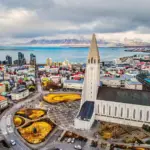
Introduction
Esquel: A Charming Town in Argentine Patagonia
Located in the stunning Patagonia region of Argentina, Esquel Esquel is a picturesque city that captivates visitors with its natural beauty and irresistible charm. Nestled amid majestic mountains, crystal-clear lakes, and vast forests, Esquel offers a unique experience for those seeking an adventure in an emerging tourist destination. With a harmonious blend of spectacular landscapes and rich local culture, this city enchants the senses and provides a truly memorable getaway.

History of Esquel as an Emerging Tourist Destination
Although it may seem like a quiet town at first glance, Esquel has a fascinating history that has contributed to its rise as an emerging tourist destination. Founded in the late 19th century by European immigrants, particularly Welsh immigrants seeking new opportunities in South America, the city began as a small agricultural settlement. However, with the discovery of valuable mineral deposits in the region and the development of the local railroad industry, Esquel began to attract both national and international attention.
From the 1970s and 1980s onwards, the region's tourism potential became evident. Its proximity to the National park Los Alerces and its beautiful natural landscapes began to attract visitors seeking adventure and tranquility.
Over the years, tourism in Esquel has developed rapidly, driven by the recognition of its natural and cultural heritage. Today, the city is an emerging tourist destination in Argentine Patagonia, offering a wide range of activities. outdoor activities, in addition to presenting a rich historical and cultural heritage.
Esquel, therefore, enchants travelers with its unique combination of stunning natural beauty and significant cultural heritageThis introduction provides just a glimpse of what's to come in this in-depth article about this charming city in the Argentine Patagonia region. Geographic Location and Characteristic Climate of the Region
Esquel is located in the Patagonia region, more precisely in the province of Chubut, Argentina. Situated at the foot of the Andes Mountains,, the city enjoys a privileged location surrounded by stunning scenery. Located in the extreme south of the country, Esquel enjoys a cool, temperate climate.
During the summer months (December to March), temperatures range between 15°C and 25°C. The days are long and sunny, providing a perfect environment for outdoor activities.
Winters (June to September) are harsh, with temperatures that can drop below zero degrees Celsius. At this time of year, the city is often blanketed in a layer of fluffy white snow, creating a magical atmosphere for winter sports enthusiasts. Natural Highlights: Majestic Mountains, Crystal-Clear Lakes, and Lush Forests
Esquel is blessed with stunning natural landscapes that capture the hearts of visitors from the first moment. The Andes Mountains surround the city with their majestic snow-capped mountains during the winter.
The possibilities for mountaineering, climbing, and scenic trails are endless in this mountainous region. Furthermore,, Esquel has several crystal clear lakes that offer not only picturesque views but also opportunities for water sports and fishing, such as Lake Futalaufquen and Lake Rivadavia.
The combination of clear water and imposing mountains creates a serene and inspiring atmosphere. The city is also embraced by lush forests that are home to a wide variety of flora and fauna.
THE Los Alerces National Park It's one of the region's most impressive natural attractions, with enchanting groves of Patagonian larch, ancient trees that lend a mystical touch to the environment. Hiking the park's trails is a rejuvenating experience for nature lovers. Distinctive Cultural Characteristics: Indigenous and European Heritage
Esquel boasts unique cultural characteristics that reflect the region's rich Indigenous and European heritage. Before the arrival of European colonizers, the area was inhabited by the indigenous Mapuche people, whose cultural influence can still be felt in local crafts, culinary traditions, and traditional festivals.
The European presence in the city is due to the arrival of Welsh settlers in the late 19th century. This influence is evident in the Welsh-style architecture found in some historic buildings, as well as in the traditional music played with typical Welsh instruments during local cultural events.
Esquel is also known for its diverse cuisine, which combines traditional Argentine dishes with elements of Welsh and Mapuche cuisine. Visitors can savor local delicacies such as charcoal-roasted Patagonian lamb and chapalele, a type of potato dumpling.
Esquel is truly a charming city, where natural beauty blends harmoniously with a rich cultural heritage. A visit to this unique region is an enriching experience that will leave lasting memories in the minds and hearts of travelers.

Los Alerces National Park: A Stunning Natural Haven
THE National park Los Alerces is a natural gem that enchants visitors with its serene beauty and stunning landscapes. Located near Esquel in Argentine Patagonia, the park encompasses a vast area dotted with crystal-clear lakes, lush forests, and imposing mountains.
Visitors can explore challenging hiking trails that lead to spectacular scenery and breathtaking panoramic views. The abundance of flora and fauna makes this experience even more memorable, with endemic species such as the larch, the park's iconic tree.

The famous La Trochita Train: A journey through time through the Andean mountains
One of Esquel's most famous attractions is the legendary La Trochita Train. Nicknamed “The Old Patagonian Express,” this historic train offers visitors an experience unique as you travel through spectacular landscapes through the majestic Andean mountains.
Built in the 1920s, the train still retains its nostalgic charm with its steam locomotives and carefully restored vintage carriages. During the journey, passengers are transported to a distant past, witnessing the magnificence of untouched nature as they traverse winding rivers and picturesque valleys.

Historic Center: The beating heart of Esquel
Esquel's Historic Center is the city's meeting point, where visitors can immerse themselves in the city's rich history and culture. Charming streets and traditional architecture invite you to explore its quaint shops, cafes, and restaurants.
The Square San Martin is the epicenter of downtown, with its monument to Argentine national hero José de San Martín. Visitors can enjoy the welcoming atmosphere as they stroll the cobblestone streets, discover local boutiques selling unique regional crafts, and savor traditional Patagonian dishes in typical restaurants.
Conclusion: Discover Esquel's magic
Esquel is a tourist destination that offers a perfect combination of lush wilderness and enchanting cultural heritage. With National park At Los Alerces, visitors can marvel at the untouched natural beauty, enjoying challenging trails and serene lakes.
The famous La Trochita Train takes you on a journey through time through the Andean mountains, offering stunning panoramic views along the way. And the Historic Center offers a glimpse into the region's history and an immersion into the local culture.
In Esquel, travelers have the unique opportunity to explore magical landscapes while immersing themselves in experiences authentic cultural experiences. The city is truly a hidden treasure of Argentine Patagonia, waiting to be discovered by those seeking adventure, natural beauty, and a deep connection with the history and people of the place.
Lucas Wanderlust has a tireless spirit of adventure, always seeking new travel experiences. Fascinated by the world and the possibility of exploring unknown destinations, he fell in love with the sense of freedom and self-discovery that traveling alone provides. With a backpack on his back and a heart open to the unknown, Lucas embarks on exciting journeys, where each destination becomes a unique chapter in his life story. He gives himself body and soul to the magic of solo travel, inspiring others to follow in his footsteps and discover themselves through adventure.







